Approaching Infinity with Keiji
Haino
The Music Series > Asakusa Jinta > Boris > Shibusashirazu > Mad3 > Keiji Haino > Ghost > Overhang Party
Never underestimate
the Captain. While most were out enjoying pleasant holiday
cheer, he was - eggnog in hand - pounding the pavement in
search of his next feature. Tireless, he is.
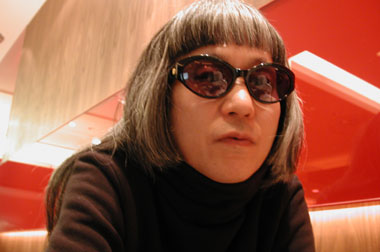 This
week he’s talking to the grandfather of Tokyo’s
underground rock scene, Keiji Haino. In case you are wondering,
that loud, grinding racket you hear is completely intentional.
This
week he’s talking to the grandfather of Tokyo’s
underground rock scene, Keiji Haino. In case you are wondering,
that loud, grinding racket you hear is completely intentional.
The lilting house
music stops. Keiji
Haino picks up his guitar and the screeching
wail begins. There is no buildup; it just starts.
It is something like a freight
train hurtling through a tunnel, the blasts of the diesel
engine mixing with the clash of steel wheels upon the rail.
Leading his two-piece band Fushitsusha, one
of his many musical incarnations, Haino and his bass player
generate an escalating, monstrous
roar for an audience of 20 people in this matchbox-sized basement
club in a western Tokyo suburb.
Attired entirely in leather, Haino whips his
long black hair - streaked with gray - back and forth as he
strums away, the house lights reflecting off his bug eye-shaped
black sunglasses.
Minutes pass. The merciless chaos then climbs
even more, creating what almost literally is an onrushing
breeze. It is a tornado mix of howl, resonation, and hum -
and it doesn’t stop.
"Everything can be infinite,” Haino
says during a recent conversation at a Shinjuku coffee shop.
“A lack of boundaries means something can go anywhere;
that's why my music is loud.”
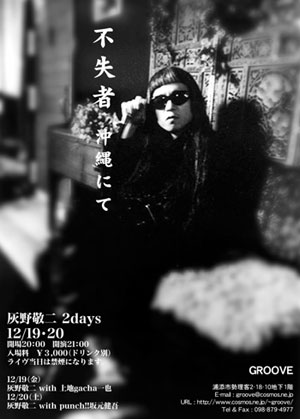 Haino’s
proclivity for piercing eardrums is based on the general concept
that he can extend the feeling of his music beyond his captive
audience - in other words, onwards toward infinity - the louder
it gets. Through this, Haino says that he envisions,
in a spiritual sense, the ancients listening to his "timeless"
music.
Haino’s
proclivity for piercing eardrums is based on the general concept
that he can extend the feeling of his music beyond his captive
audience - in other words, onwards toward infinity - the louder
it gets. Through this, Haino says that he envisions,
in a spiritual sense, the ancients listening to his "timeless"
music.
Whether they are thanking him is another topic
entirely; Haino’s work is not for the thin-skinned.
His abrasive assault is indeed an acquired taste.
“I use the electric guitar as a weapon
to express myself,” he explains. “It is one of
my tools.”
Since starting over 30 years ago, the 52-year
old Haino has generally kept his same "loud music"
philosophy and amassed quite a resume in rock. Through his
extensive number of live appearances and continual album releases
in Japan and abroad, he has become one of the most respected
figures in the Tokyo
underground rock scene.
Haino's recorded output comes in many different
ensembles. His solo work typically features searing guitar
improvisation atop Haino's anguished delivery of lyrics, which often center on themes of frustration and yearning.
"Black Blues," an album that comes
in both an acoustic and electric version, is his latest solo
release. Both sessions capture Haino tearing himself open
through hushes, shrieks, and guitar work.
Collaborations with musicians locally and overseas
have provided Haino a chance to explore a different mix of
sounds.
His 1996 joint effort with Peter Brotzman,
"Evolving Blush or Driving Original Sin," pits Haino's
guitar and yelping vocals against Brotzman's screeching saxophone.
“I'm basically a vocalist and not a guitarist,"
explains Haino, who has learned to play roughly 80 instruments
himself and maintains that audiences only see a small fraction
of his arsenal at any particular live show. "By knowing
the music of many instruments it helps me to collaborate with
others. When I understand an instrument being played by another
person it is easier for me to understand what is happening
when we play together."
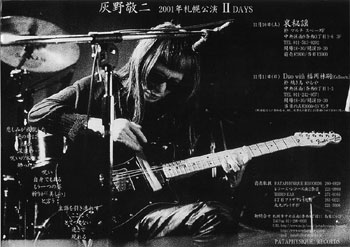 Though there are not many, Haino does have his moments of relative subtlety. While still tinged with his own unique tortured twist, his work with the traditional shamisen or his near acoustic jazz guitar playing (as demonstrated in "Hikari Yami Uchitokeasishi Kono Hibiki"), show a quiter side of the man in black.
Though there are not many, Haino does have his moments of relative subtlety. While still tinged with his own unique tortured twist, his work with the traditional shamisen or his near acoustic jazz guitar playing (as demonstrated in "Hikari Yami Uchitokeasishi Kono Hibiki"), show a quiter side of the man in black.
Fushitsusha
and Haino's cover band, Aihiyo, give him the opportunity to
rock with a full band, the arrangement he says he finds most enjoyable.
But finding a lineup to match his style has never been easy.
"They were not my friends," he says
of the gathering of the original members of Fushitsusha in
the late '70s, "but all the people who told me they wanted
to play with me."
Haino's first proper band was Lost Aaraaf,
which provided tracks to the 1971 compilation album "Sanritsuka
Genyasai." During this period, Haino was caught up in
the lyrics and music of Jim Morrison and Bob Dylan. His first
solo album, "Watashi Dake," came 10 years later.
Even though Fushitsusha formed during this gap in recordings,
Haino says there was a general lack of interest in his brand
of music in Tokyo.
"When I played back then," he remembers,
"everyone became angry and left. People didn't like my
music. There was no demand for me to play; I was not wanted.
But I would like to believe that that wasn't true."
Today, Haino is prolific on the live scene,
often exposing sparse audiences to his power chord attack
a few times a week in the Tokyo area. As well, he occasionally
takes his show overseas to Europe and the U.S.
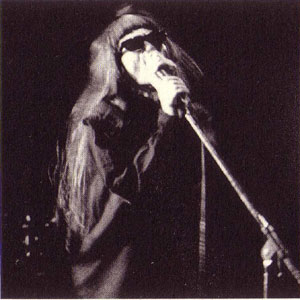 “I
don't think it (the scene) has gotten better," he says
of today's Tokyo scene. "Even though the live scene has
expanded the Japanese mentality has not changed.
“I
don't think it (the scene) has gotten better," he says
of today's Tokyo scene. "Even though the live scene has
expanded the Japanese mentality has not changed.
"We (Japanese) are brainwashed,"
he says of Japan's tendency towards collectivism. "We
don't have an antenna to capture other interests and expand
our minds."
Haino has found
international audiences much more receptive. Though he
was able to sign a recording contract with major domestic
label Tokuma Japan in 1997, his respect overseas has been
much more substantial: John Zorn has produced and released
albums; members of rock band Sonic Youth have shared a stage with him;
and guitarist Lorren MazzaCane Connors has joined him for recording sessions.
Like his dark and mystical album covers, which
usually feature a dark, grainy photo of Haino with guitar
and glasses, Haino speaks in mystic
phrasing. In discussing why his music has been of roughly
the same style during his three-decade career, he begins by
saying, "anger will never be put to rest," yet he
will never directly say that his music is rooted in anger.
He adds, "The surface level of my music might have changed
but the core, or origin, has not changed."
In fact, he maintains that words are not the
best way for him to express himself. "Music is my best
expression of my mind."
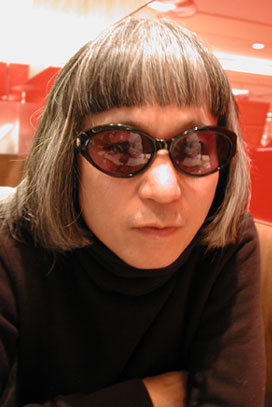 Achieving
an appropriate mood is a key to proper expression, Haino says.
"To understand the air, or atmosphere, of a club leads
to an understanding of the whole experience. I will breath
in and exhale as I play an instrument live. I will then repeat
that process with this circulation of air slowly expanding
and surrounding the entire audience as the show proceeds.
Achieving
an appropriate mood is a key to proper expression, Haino says.
"To understand the air, or atmosphere, of a club leads
to an understanding of the whole experience. I will breath
in and exhale as I play an instrument live. I will then repeat
that process with this circulation of air slowly expanding
and surrounding the entire audience as the show proceeds.
"I don't want this air to be trapped in
this live venue; I want it to float all over. It's not a matter
of the music volume; it is more about spreading this feeling.
That's why my music feels loud."
The impact Haino has had on Tokyo's underground
rock scene, largely comprised of the roster of bands on the
PSF (Psychedelic Speed Freaks)
label, has been undeniable. But he is hesitant to take any
credit for being the elder member of the movement; he is more
interested in continuing with his musical compositions than
commenting on his impact. "Actions speak louder than
words," he says.
Haino is showing no signs of slowing down.
Presently he is learning to play the Nyckelharpa, a 16-string
Swedish folk instrument. Keys set atop the roughly guitar-shaped
body are played with the left hand while a bow is moved over
the strings with the right.
January will see Haino embarking on the recording
of an electronic solo album. "I’ll be using a new
weapon," he says.
And onwards toward infinity…
Note: Ai Matsui, Yukiko Kuwamura, and Sayuri
Okamoto contributed to this report from the Tokyo bureau.
Keiji
Haino will be assaulting Shinjuku's Golden Gai in Kabukicho
on December 31st. Reserve one of the 10 seats by phone: 03-3207-8305.
Music by Keiji Haino can be purchased through Aquarius
Records.
The Music Series > Asakusa Jinta > Boris > Shibusashirazu > Mad3 > Keiji Haino > Ghost > Overhang Party

